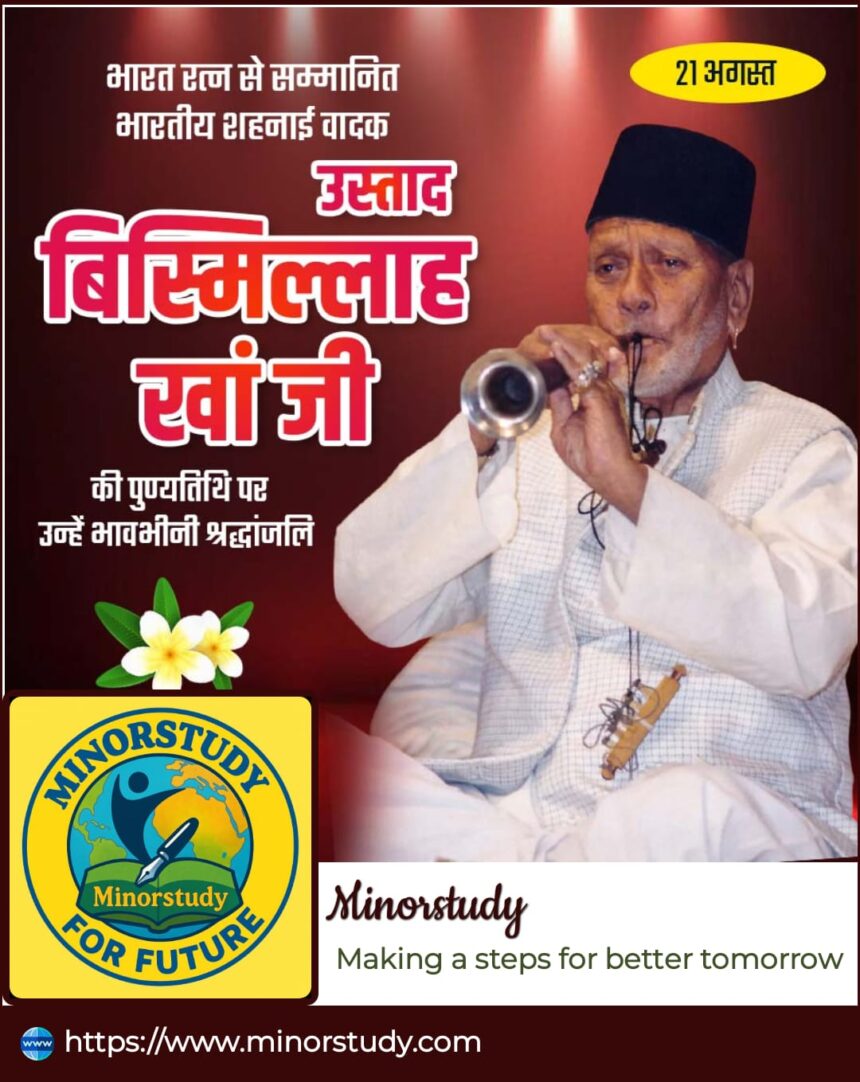🌟 Introduction: The Eternal Shehnai Maestro
Music has the power to touch hearts beyond language, culture, and borders. Among the countless legends of Indian classical music, one name stands tall with unmatched grace and devotion—Ustad Bismillah Khan Ji. Known as the Shehnai Maestro of India, his music was not just art but a soulful prayer, an offering of devotion to the divine.
- 📖 Biography of Ustad Bismillah Khan Ji
- 📜 Timeline of Ustad Bismillah Khan Ji
- 🎼 History and Contribution of Ustad Bismillah Khan Ji
- 📊 Interesting Facts About Ustad Bismillah Khan Ji
- 🌟 Significance of Ustad Bismillah Khan Ji in Indian Culture
- 1. Elevating the Shehnai
- 2. Symbol of Simplicity & Humility
- 3. Cultural Bridge
- 4. Global Ambassador of Indian Music
- 5. Inspiration for Artists
- 🌍 Importance in Daily Life and Society
- 💬 Wishing on Ustad Bismillah Khan Ji’s Birth Anniversary or Remembrance
- ❓ FAQs on Ustad Bismillah Khan Ji
- ✅ Key Takeaways & Important Points
- 🌈 Conclusion: Daily Life Impacts of Ustad Bismillah Khan Ji’s Legacy
Even today, decades after his passing, his melodies echo in our hearts. His life is an inspiring story of humility, dedication, spirituality, and love for music. Let’s explore his biography, history, timeline, facts, significance, FAQs, and life impact in detail.
📖 Biography of Ustad Bismillah Khan Ji
Full Name: Qamaruddin “Bismillah” Khan
Born: 21 March 1916, Dumraon, Bihar, India
Family Background: Born into a family of traditional musicians—his ancestors played shehnai in princely courts.
Early Music Training: Learned under his uncle, Ali Bux ‘Vilayatu’ Khan, who served at the Vishwanath Temple in Varanasi.
Career Highlights: Elevated the shehnai, once considered a folk instrument, to the concert stage of Indian classical music.
Major Performances: Played at India’s Independence Day ceremony in 1947, at the Red Fort, marking a historic moment.
Awards & Honors:
Bharat Ratna (2001) – India’s highest civilian honor
Padma Vibhushan (1980)
Padma Bhushan (1968)
Padma Shri (1961)
Died: 21 August 2006, Varanasi, India
📜 Timeline of Ustad Bismillah Khan Ji
1916 – Born in Dumraon, Bihar, into a family of court musicians.
1930s – Trained in Varanasi under his uncle Ali Bux.
1937 – Gained recognition at the All India Music Conference in Kolkata.
1947 – Performed at India’s Independence Day celebrations at the Red Fort.
1950s–2000s – Represented Indian music globally with concerts in the USA, UK, Iran, Canada, and more.
2001 – Received the Bharat Ratna, the highest honor of India.
2006 – Passed away, leaving behind a legacy of devotion through music.
🎼 History and Contribution of Ustad Bismillah Khan Ji
The shehnai was traditionally played at weddings and temples, not considered a classical instrument. But Ustad Bismillah Khan Ji transformed its destiny. Through his dedication, he gave it the respect it deserved in the world of Hindustani classical music.
His music was deeply spiritual—he often said that playing shehnai was his way of connecting with Lord Shiva at the Kashi Vishwanath Temple. His performances were not just concerts; they were musical offerings to the divine.
He also represented India’s cultural unity. Though a devout Muslim, he spent his life in Varanasi, a city deeply rooted in Hindu traditions. This highlighted the harmony between faiths and how music transcends religion.
📊 Interesting Facts About Ustad Bismillah Khan Ji
Bismillah Khan’s Birth Name was Qamaruddin Khan, but his grandfather declared “Bismillah!” upon his birth, and the name stayed forever.
He played the shehnai at the Red Fort on 15th August 1947, as India celebrated its independence.
Despite global fame, he chose a simple life in Varanasi, never running after wealth.
He refused lucrative offers to settle abroad because he could not live without Ganga, Varanasi, and his music.
He appeared in films like Goonj Uthi Shehnai (1959), where his shehnai was the soul of the music.
His favorite place to practice was the banks of the Ganga river, believing the flow inspired his music.
Even with the Bharat Ratna, he remained humble, saying, “Music is my life, awards are just recognition.”
🌟 Significance of Ustad Bismillah Khan Ji in Indian Culture
1. Elevating the Shehnai
He gave the shehnai a global identity, turning it into an instrument of classical prestige.
2. Symbol of Simplicity & Humility
Despite worldwide fame, he lived simply in a small house in Varanasi, reminding us that greatness comes from humility.
3. Cultural Bridge
His life reflected India’s secular fabric—a Muslim shehnai player dedicating his life to Hindu temples and Ganga ghats.
4. Global Ambassador of Indian Music
He took Indian classical music to world stages, earning respect across continents.
5. Inspiration for Artists
His journey motivates countless musicians to pursue their art with devotion rather than material gain.
🌍 Importance in Daily Life and Society
Inspiration for Youth – His life teaches patience, dedication, and devotion to one’s art.
Respect for Elders & Culture – By honoring his legacy, we learn to preserve our traditions.
Spiritual Peace – His shehnai tunes still bring calmness, meditation, and inner peace.
Cultural Identity – Reminds us of India’s rich heritage and secular spirit.
Art Over Wealth – Shows us that passion, not money, defines true success.
💬 Wishing on Ustad Bismillah Khan Ji’s Birth Anniversary or Remembrance
Here are some thoughtful wishes to honor his memory:
“Remembering the Shehnai Maestro, Ustad Bismillah Khan Ji, whose music still flows like the Ganga—pure and eternal.”
“On this day, let us celebrate the life of Ustad Bismillah Khan Ji, a symbol of humility, devotion, and musical brilliance.”
“Happy remembrance of Ustad Bismillah Khan Ji! May his melodies inspire generations to respect music and culture.”
“The shehnai of Ustad Bismillah Khan Ji will forever echo in our hearts as the sound of purity and devotion.”
❓ FAQs on Ustad Bismillah Khan Ji
Q1. Who was Ustad Bismillah Khan Ji?
👉 He was an Indian classical musician and shehnai maestro who gave global recognition to the shehnai.
Q2. When was Ustad Bismillah Khan born?
👉 He was born on 21 March 1916 in Dumraon, Bihar.
Q3. What was his contribution to Indian music?
👉 He elevated the shehnai to a classical concert instrument and spread Indian music worldwide.
Q4. Which awards did he receive?
👉 He received the Bharat Ratna, Padma Vibhushan, Padma Bhushan, and Padma Shri.
Q5. When did Ustad Bismillah Khan Ji pass away?
👉 He passed away on 21 August 2006 in Varanasi.
✅ Key Takeaways & Important Points
Birth: 21 March 1916, Dumraon, Bihar
Instrument: Shehnai
Famous For: Playing at India’s Independence Day, 1947
Awards: Bharat Ratna, Padma Vibhushan, Padma Bhushan, Padma Shri
Legacy: Elevated the shehnai globally, symbol of humility and cultural unity
🌈 Conclusion: Daily Life Impacts of Ustad Bismillah Khan Ji’s Legacy
The life of Ustad Bismillah Khan Ji is not just about music—it is about values that resonate in our daily lives. His simplicity teaches us that success without humility is hollow. His devotion shows us that passion is greater than wealth. His faith in both music and humanity reminds us that art transcends boundaries.
Every time the shehnai plays at a wedding, temple, or celebration, it carries the blessing of Ustad Ji’s legacy. He made the shehnai not just an instrument but a symbol of purity, devotion, and cultural pride.
In a world often divided, his story is a reminder that true greatness lies in uniting hearts through art, humility, and love.









Some really prime content on this website , bookmarked.